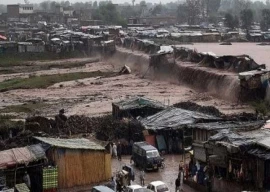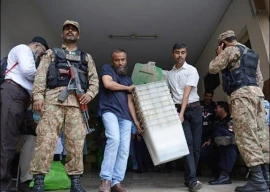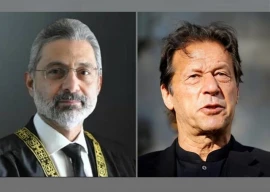
KARACHI:
I went into the Karachi Literature Festival session titled ‘Afghanistan and Pakistan: conflict, extremism and the Taliban’ expecting not just old wine in an even older bottle, but fearing that the wine would have turned into vinegar. Simply put, I was expecting the usual round of accusations, self-flagellation and mea culpas that are par for the course in any discussion about Pakistan’s role in Afghanistan.
Thankfully, I was proven wrong. Far from the compulsive hand-wringing that has characterised such talks in the past, there was a palpable atmosphere of pragmatism and realism about the Afghan conundrum – along with a clear indication that most of the panelists, as well as the audience, had had just about enough of the constant blame being heaped on Pakistan.
The panelists were Ahmed Rashid, author of several books on militancy and the Taliban, former ambassador to the US Dr Maleeha Lodhi, author and historian William Dalrymple and Naveed Kirmani, an Iranian academic currently based in Germany. The session was moderated by Professor Rasul Baksh Rais who began the discussion by posing a question: What has gone wrong with Pakistan and Afghanistan? Rashid answered with a brief history of Pakistan’s involvement in Afghanistan, ending with a call for a ‘statesmanlike’ approach from Pakistan’s leadership towards the issue.
Kirmani, however, steered the discussion in a different direction, saying that despite popular belief, Pakistan was by no means the only state interfering in Afghanistan’s affairs. Every single regional country, and quite a few extra-regional ones, were busy manipulating Afghan factions for their own interests. Amid all this, and because of it, Afghan interests were being completely ignored.
Dr Lodhi chose to focus on what she sees as changes in Pakistan’s approach to Afghanistan. The need for a ‘friendly’ government in Afghanistan, a long-standing canard of Pakistan’s foreign policy, is no longer emphasised. Instead, the rhetoric has shifted in calling for a ‘stable and peaceful’ Afghanistan. While this can be dismissed as semantics, Dr Lodhi convincingly argued that it is indicative of a lowering of expectations and a taming of ambition on Pakistan’s part. Of course, that same drawdown is visible in the diplomatic stance of the US as well. Talk of defeating and routing the Taliban has long since been abandoned in favour of dialogue and reconciliation.
In fact, Dr Lodhi argued that the US position is now entirely in line with what she says was Pakistan’s advice to the US immediately after 9/11: to seek a diplomatic solution, to distinguish between the Taliban and al Qaeda and to not try and fight an unwinnable war.
That any war in Afghanistan is unwinnable is a point that Dalrymple made quite eloquently – citing examples of similarly doomed military adventures from Mughal times all the way to the present. Sadly, as Rashid pointed out, just when the positions of Pakistan and the US are closer than ever, relations are at their lowest ebb.
It was an effective gauge of the mood of the audience that when Dr Lodhi made an impassioned plea for the world to stop demonising Pakistan, she was met with applause. The general consensus seemed to be that Pakistan, which is blessed or cursed (depending on your perspective) by its geographical location, has learned its lessons in Afghanistan, and that it was time the world at large did the same.
As far as the endgame is concerned, Dalrymple felt that Afghanistan would revert to its ‘natural’ state of fragmentation, and that the conflict would become more explicitly ethnic in nature as time passed. What that means for Pakistan is a question that remained unanswered.
Published in The Express Tribune, February 12th, 2012.


































































COMMENTS
Comments are moderated and generally will be posted if they are on-topic and not abusive.
For more information, please see our Comments FAQ